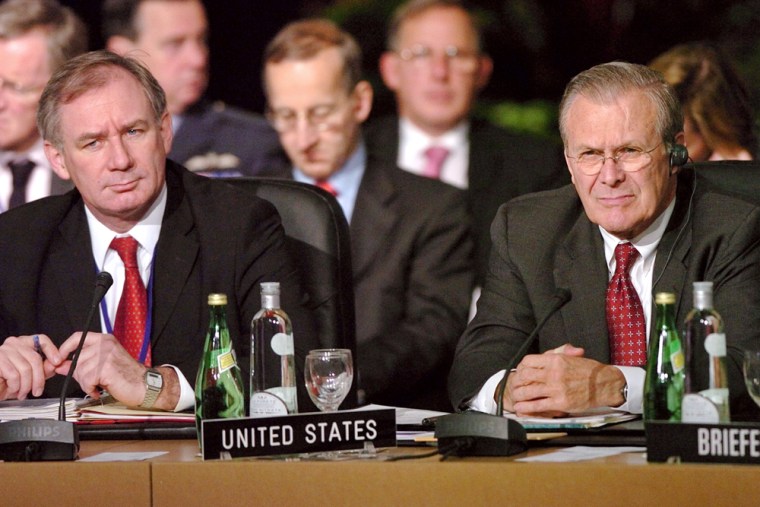U.S. allies in Europe have so far mustered fewer than 100 trainers to go to Iraq to assist in the modest NATO mission there, but a top American general said Thursday he was hopeful they would offer several dozen more in the coming weeks.
“We’ve asked for more than what has been provided so far,” said Army Lt. Gen. David Petraeus, who oversees the effort to train and equip Iraq’s security and military forces. Petraeus joined U.S. Defense Secretary Donald Rumsfeld in Nice for a meeting of NATO defense ministers.
Later Thursday, NATO Secretary General Jaap de Hoop Scheffer, speaking to reporters in Nice, said he hopes to see the total NATO commitment in Iraq rise to about 360, a figure that includes security personnel to protect the trainers.
The NATO mission in Iraq, while small, aims to develop Iraq’s military on a strategic level, rather than train individual soldiers. This includes efforts to set up military staff and officer colleges. Bush administration officials have also advocated the NATO mission as a way of pushing the alliance to transform into a more deployable, internationally involved force.
Mission aims at strategic development
The NATO mission in Iraq, while small, aims to develop Iraq’s military on a strategic level, rather than train individual soldiers. This includes efforts to set up military staff and officer colleges. Bush administration officials have also advocated the NATO mission as a way of pushing NATO to transform into a more deployable, internationally involved alliance.
Other NATO allies have declined Washington’s appeal to send trainers to Iraq but have offered equipment, money or to conduct training outside Iraq’s borders.
The Spanish defense minister on Wednesday said Spain would train soldiers in land-mine removal techniques, and the French minister renewed an offer for French gendarmes to set up a training center for Iraqi paramilitary forces in Qatar. France opposed the Iraq war, and Spanish voters have elected a new government whose members also opposed it. Germany, another opponent, already conducts training for Iraqi security personnel in the United Arab Emirates.
Petraeus said about between 90 to 100 trainers are in Iraq now. A substantial number are Americans working under the NATO banner, but precise figures were unavailable. He said the goal is to get that to 159 trainers from NATO nations. Previous statements from NATO officials put the number of trainers at 300, but Petraeus said he could not speak to that figure.
The NATO secretary general also said the alliance was ready to expand peacekeeping and reconstruction operation in Afghanistan, committing about 900 troops to assist in the western part of the country along the Iranian border, with Italy, Spain and Lithuania ending months of delay by offering troops to support U.S. forces under NATO command.
“NATO is committed to Afghanistan for the long term,” Scheffer told reporters. The 900 would include 400 drawn from Kabul and the rest brought in from outside the country.
Ahead of Thursday’s session, Germany offered to increase its commitment in Afghanistan. Defense Minister Peter Struck told reporters Wednesday night that German troops could take a lead role in northern Afghanistan, relieving British forces who are expected to expand NATO’s mission into a southern sector around Kandahar later this year.
NATO presence growing in Afghanistan
The moves into the west and south are part of a gradual plan for the 8,500-strong NATO peacekeeping force to take over responsibility for the whole country, integrating the larger U.S.-led combat force still fighting Taliban and al-Qaida remnants.
NATO diplomats hope progress Thursday could set the alliance on course to integrate the two forces early in 2006.
Washington has long sought such a fusion, hoping to free up the thousands of frontline troops it still has in Afghanistan. However, the U.S. will keep some units in Afghanistan,
Ministers also were likely to have engaged in discussion of a possible NATO role monitoring an eventual peace agreement between Israelis and Palestinians. Scheffer this week said the alliance would respond if asked for help from the two sides in the Middle East conflict and the United Nations.
